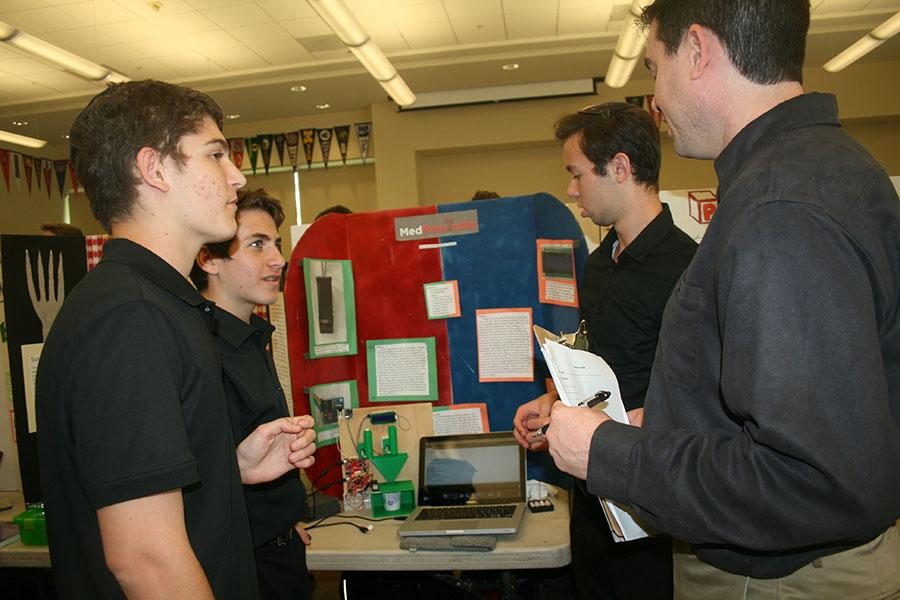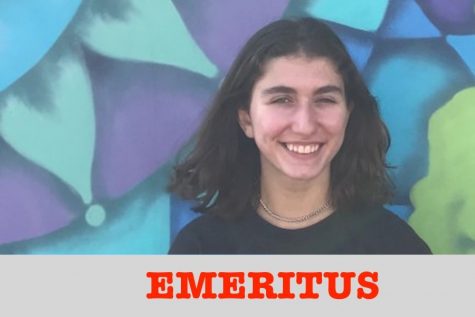CIJE students at conference offer tech inventions for daily life
INVENT: Sophomores Zev Kent, Ezra Fax and Eytan Rosenman at the CIJE conference in Irvine May 20
June 24, 2015
A moisture sensor that tells users when their plants require watering. A robotic pair of legs that can be programmed to different speeds. A pillow alarm clock. A fork that tells its users when they are eating too quickly. These are just a few of 80 robotic biomedical projects presented at the 2nd Annual West Coast CIJE conference May 20 in Orange County.
Held in Irvine at the Jewish day school Tarbut V’Torah, about 240 Jewish high schoolers attended from 10 Jewish schools all over Southern California. Thirty Shalhevet students attended, along with CIJE coach and science teacher Ms. Melanie Fine.
CIJE — an acronym for Center for Initiatives in Jewish Education — is actually a national foundation promoting science and technology education in Jewish schools. At Shalhevet , it is an engineering and robotics class split in to two sections, the freshman class, which met on Mondays and Wednesdays this year, and the sophomore and junior group, which met Tuesdays and Thursdays.
“Today is the culmination of all their hard work.” Ms. Fine said as excited students approached her for computer chargers, assistance and relief. “I expect the kids are going to renew their motivation for why they did this in the first place.”
Nerves and excitement were high and the huge room buzzed with tension as students quickly set up their projects, with each group assigned its own table in the auditorium. Students immediately plugged in their projects and scanned their computer screens for last-minute bugs in the code or wiring.
Scanning the scene with possibly more excitement than the kids themselves were Ms. Fine and Mr. Adrian Krag, CIJE’s West Coast Director of Operations, who had worked closely with every student in CIJE on the West Coast, not just those at Shalhevet. Mr. Krag new better than anyone what a long, grueling, yet educational process preparing for that day had been.
“I am more nervous than excited,” said Mr. Krag, watching from the back of the auditorium, “because there are so many things going on and there are hundreds of thousands of things that could go wrong, and I just want everybody to have a good experience.”
Four projects, he said, were already not working when they got to the fair. But at the end of the interview, his point was positive.
“Our students have done some absolutely amazing projects,” Mr. Krag said. “Things that adults with 20, 30, 40 years of experience could not manage to do, some of our freshman and sophomores have pulled off.”
By 10:30 AM, nearly all the students had arrived. A diverse array of enterprises presented themselves.
The “Alarm Clock Pillow” was developed by Shalhevet sophomores Alec Fields, Isaac Goor, and Noah Suissa ,” who designed a pillow that vibrates and beeps at wake-up time.
Fellow sophomores Ezra Fax, Zev Kent and Eytan Rosenman created an alarm clock system for pills, which alerts users when they need to take their pills. An LCD screen tells how to the medication should be taken, and the whole device is controlled by a fingerprint scanner so that it’s all child-safe.
Inspired by long, boring drives home stuck in L.A. traffic, freshmen Amin Lari, Daniel Lorell, Jacob Feitelberg and Noah Mermelstein created a machine that changes the music playing in a car according to the driver’s mood, which is measured by body temperature and heartrate, taken by a pulse sensor. The faster a person’s pulse, the more upbeat, exciting music would emanate from the buyer’s phone.
Dean Neutel of Tarbut V’Torah created with two other teenaged engineers a set of blinds which close when detecting heat, so as to preserve the energy of users, as well as limit air-conditioning usage.
Jonathan Mizrachi, a YULA freshman, was inspired by a scene from Back to the Future 2 to create a self-tying shoe. At the click of a button, motors connected to the shoelaces pull them back and tighten them.
After an hour of students roaming free to look at other projects, the judging period began. Ms. Fine and Heidi Theisen, director of STEM programs at Tarbut, were among judges at the event.
“I think the kids came up with really creative ideas to real world problems,” said Ms. Thiesen. “I’m amazed at how much coding the kids learned in a year or two, that they could actually build working prototypes.”
For some students, the judging period was less eventful. Sam Hirschorn hoped for a more strenuous judging process.
“The annoying thing at the CIJE fair was that we worked on these projects for eight months, and at the conference; five points, creativity, five points, enthusiasm, five points for work ethic and team work skills. I thought that was really annoying.”
Also present at the conference was former Shalhevet math and science teacher Mr. Chris Buckley, who will be teaching CIJE at Valley Torah next year.
“I think there were a lot of good ideas out there, a lot of original thinking,” Mr. Buckley said. “I think one thing that could be improved upon in the future is maybe have a greater percentage of projects that work, that do what they’re designed to do.”
Nearing the end of the day, Shalhevet tech expert Yossie Frankel gave a speech highlighting the importance of CIJE, explaining that only 20 percent of people can do what 60 percent of careers require in the 21st century, technologically speaking.
Mr. Frankel ended the speech by proclaiming, “We are preparing for tomorrow, today.”
CIJE was started at Shalhevet last year by former science teacher Dr. Jay Smallwood, and this year was organized by Ms. Fine. This year’s program struggled with a new teacher and lack of a science room in the school’s temporary facility at the JCC.
The new building, set to open this summer, has two large science labs.














